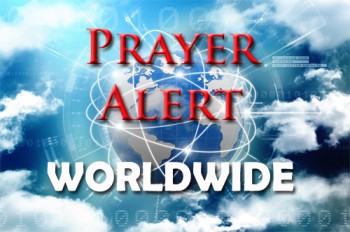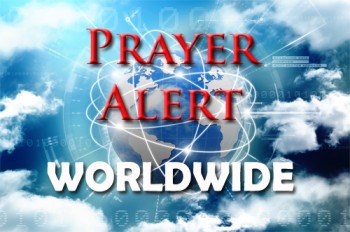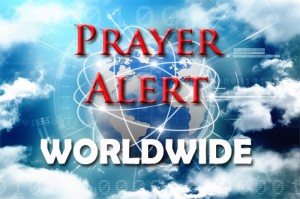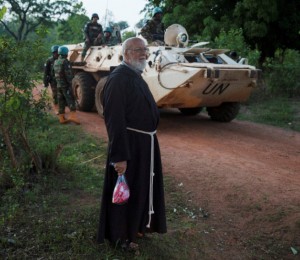Displaying items by tag: Conflicts
Battle over the USA
November 2020 will be the 400th anniversary of the arrival of the Pilgrim Fathers from Plymouth, England, to Plymouth, Massachusetts. They left England to escape religious persecution and establish the freedom of self-government, in the New World. The Declaration of Independence and the constitution were laid down by the founding fathers. The USA became a blessing to desperate and hopeful people from the nations, because of the culture of freedom and faith in God. American missionaries invested their lives in the spiritual restoration of the Old Continent, and until now have continued to impact the nations of Europe with the Kingdom of God. However, the strategy of the enemy is to destabilise, create conflicts in society, and gain control of governments. In 2020 the tragic death of George Floyd, BLM riots, and an out-of-control pandemic are threatening a divided electorate prior to November’s elections and the 400th anniversary of God’s freedom in the new world.
Asia and Africa: change and conflict
In Algeria and Sudan, peaceful protesters are continuing to demand genuine change, but the military - the most powerful institution in both countries - resist the calls. Both countries know that ousting an authoritarian leader is no guarantee of reform. In each case, Christian communities have added their voices to the calls for greater democracy and transparency. In the Holy Land, recent violence saw Islamic militants from Gaza launch 600+ rockets into Israel, and Israel responding with a heavy bombardment. Both sides eventually agreed a ceasefire, which is currently holding, but the UN envoy to the Middle East warned on 13 May that the risk of another war ‘remains imminent’. Half the Christian population has returned to Iraq following the collapse of IS, but they are returning to broken towns and Iran-backed militias in the Nineveh area. The search for peace, good governance, fairness, justice and dignity continues.
Countries needing prayer in 2019
Cameroon’s president Paul Biya said he wants dialogue with separatist elements to end the ongoing security crisis in the country’s English-speaking regions. But in the same breath, he threatened, ‘If my appeal to warmongers remains unheeded, the defence and security forces will be instructed to neutralise them. I am aware of the difficulties the rebels are putting citizens in.’ Criminal gangs are exploiting the chaos to expand their activities. See http://www.africanews.com/2018/12/31/cameroon-president-ready-for-dialogue-over-anglophone-crisis/ Pray also for peace in Venezuela, for the thousands who have fled, and the families of those killed. 90% of Venezuelans live in poverty. Malnutrition is rampant. Once-eradicated diseases have returned. 3 million have fled to Colombia. Outsiders say President Maduro is a control freak, and Venezuelans need a revolution. Pray that Mr Maduro will listen to wisdom that will bring relief to citizens. See https://www.forbes.com/sites/francescoppola/2018/12/31/why-venezuelas-hyperinflation-problem-is-so-difficult-to-solve/#660ea3c6373c For other urgent international challenges, click the ‘More’ link.
Peacemaking Power of Prayer
Religious leaders have achieved a truce between rebel groups in the Central African Republic through a ‘spiritually inspired’ method.
JUNE 20, 2017 —One of Africa’s worst conflicts may have finally ended through a rare type of diplomacy. On June 19, more than a dozen armed groups in the Central African Republic signed a peace accord. Yet they did not do so through an official negotiator. Rather a religious group in Italy used what it calls a “spiritually inspired” method – building empathy and compassion – to help forge a truce.
This diplomatic feat was achieved by the Community of Sant’Egidio, a Roman Catholic lay group that works quietly and discreetly around the world to end conflicts. It puts prayer at the heart of its mediation. Its efforts have been so successful that the United Nations formally signed an agreement on June 9 to cooperate with Sant’Egidio in ending other conflicts. Its president, Marco Impagliazzo, says the group’s success lies in being seen as a neutral party that relies on patience and shared values to create trust between foes.
A Dutch scholar, Gerrie ter Haar, explains such faith-based diplomacy: “Bringing the spiritual dimension into the peacemaking process can create access to the more deep-seated, affective base of the parties’ behavior, enabling them to examine critically their own attitudes and actions.”
The conflict in the Central African Republic erupted in 2013 when the mainly Muslim Seleka rebels took power, triggering violent reprisals by militia groups that are nominally Christian. As many as 6,000 people have died. From the start, however, local religious leaders – Islamic, Catholic, and Protestant – played a key part in protecting civilians and initiating talks. They described their “weapons” as “prayer and dialogue.”
As fears of genocide grew, however, the UN, France, and the African Union sent in troops to quell the fighting. This allowed the election of a new president last year, although his influence barely extends beyond the capital. When fighting erupted again in May and more than 100,000 people had to flee, Sant’Egidio was able to bring 13 rebel groups to Rome for talks and reach a deal.
Many details of the pact still need to be implemented. And victims of the violence await the establishment of a commission to document the atrocities and achieve a level of justice and social reconciliation.
But the country, which is one of the poorest in Africa, is now rebuilding. And that is due in part to a type of conflict resolution that uses spiritual qualities to transcend divisions and end wars.
Let us rejoice that united prayer can be used of the Lord to heal conflicts and begin to pray for those areas of the world where there are ongoing conflicts.



